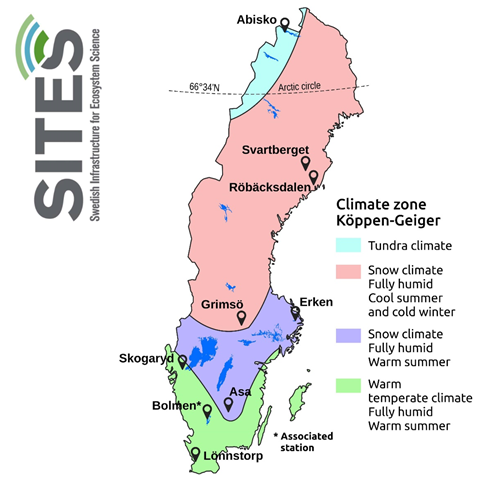Are you writing a grant proposal on ecosystem research? SITES is for you!

The Swedish Infrastructure for Ecosystem Science (SITES) aims to enable researchers like you to enhance field-based ecosystem research by supporting a network of field stations across Sweden. SITES offers expert technical competence at these stations to help plan and implement your research, open access to local monitoring and remote sensing data, and contextual information about the surrounding ecosystems. SITES provides a rich context for setting up your experiment at one or multiple stations across Sweden.
SITES supports field-based ecosystem research across Sweden, focusing on terrestrial ecosystems and inland waters while recognizing the connectivity of elements within and between landscapes. At the core of SITES is a set of active and well-equipped Research Stations representing a variety of climatic zones and ecosystems and offering unique infrastructure and competence to support researchers. SITES promotes, facilitates and maintains long-term measurements and experiments and provides access to data from these activities.
SITES operates three Thematic Programmes across stations:
- Water - a monitoring programme measuring hydrological, physical, chemical, and biological parameters within lakes and streams
- AquaNet - access to large-scale lake mesocosm experiments
- Spectral - spectral data for ecosystem monitoring and upscaling
Science enabled by SITES integrates observations made at scales ranging from molecules and organisms to ecosystems and landscapes. This approach allows the study of linkages between various ecological and biogeochemical aspects – which can be further coupled with ecosystem services such as agricultural and forestry production, access to clean water and maintained biodiversity.
SITES provides:
- Open data access – via the SITES Data Portal with data on key ecosystem variables from historical and ongoing monitoring activities at the stations, providing context and augmenting new data collected. Further comprehensive maps and documentation on the ecosystems, catchments and sampling schemes surrounding the research stations are also available.
- Physical access – users can conduct experiments and/or measurements at one or several SITES stations with technical and practical support provided by station staff.
- Experimental access – users can access long-term and large-scale ecosystem manipulation experiments beyond what is tractable for individual researchers or projects.
- Remote access – practical work, such as sample or data collection, is conducted on-site by station staff.
- Community access – a forum and platform for integrative ecosystem science community building, connections to international networks and infrastructures and access to resources, tools and data to develop and enable high-quality and integrated ecosystem science studies.
Access to the SITES infrastructure and data is free of charge. All data is openly available, contingent on acceptance of a license agreement and due recognition of the data provider. If projects need assistance or support beyond what SITES provide as a VR-funded infrastructure, a fee is charged at the discretion of the station. Station staff have broad competence to support researchers with advice and technical assistance. If you are interested in including SITES infrastructure in a grant application, please get in touch in advance to make sure SITES can accommodate your needs.
Contact info@fieldsites.se or reach out directly to the Secretariat, Station Managers or Thematic Programme Leads.